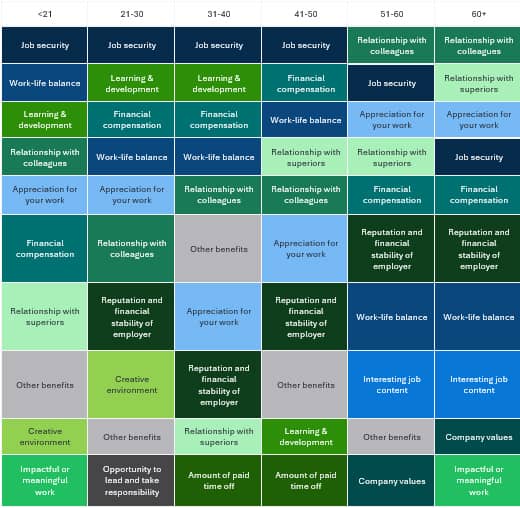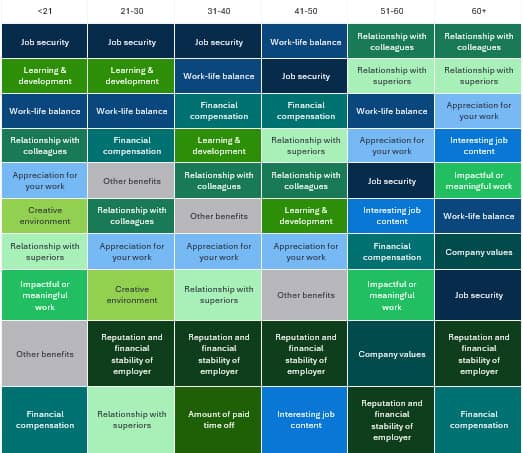Decoding Global Talent: Understanding hospitality talent migration
Drawing on insights from 150,000 workers across 188 countries, the latest Decoding Global Talent report reveals the key wants, needs, and ambitions of hospitality workers worldwide.

Across the hospitality industry, the demand for skilled talent is higher than ever.
Whether at home or abroad, this means that understanding the motivations of hospitality workers is central to being able to overcome hiring challenges and build a robust talent pipeline that allows your business to thrive.
Recent changes to visa regulations, mean that migrants must earn a minimum salary of £38,700.
While this has made international recruitment more challenging, for roles such as chefs, restaurant managers, hotel managers, and bar managers still benefit significantly from global recruitment drives.
To help with this, and to unpick the universal opinions of hospitality workers, the Global Talent Survey draws insights from 150,000 people, including nearly 5,000 within the hospitality sector, and provides a comprehensive view of mobility trends and the driving factors behind career decisions in the industry.
Conducted by The StepStone Group and Boston Consulting Group, it’s one of the world’s largest workforce studies, meaning at Caterer.com, we can offer unparalleled insights into the changing dynamics of the hospitality industry.
Shifting mobility trends
Across all industries, the study reveals that 63% of people are willing to move abroad for work, with 23% actively seeking new opportunities. Although this is a decrease from the 78% who were willing to relocate in 2018, the number of people actively searching for a job overseas has increased by 10%.
With ‘quality of job opportunities’ being the primary reason that people are attracted to the UK, employers in all sectors have a prime opportunity to find the talent they need amidst talent shortages. The study found that 3 in 4 (77%) people are open to relocating to the UK, with 1 in 6 citing Great Britain as their dream destination.
Positively, for those working in hospitality, the desire to relocate is even stronger. Two-thirds (66%) of hospitality workers are open to moving abroad, with 30% actively searching for the right opportunity.
Interestingly, while the research found that 69% of the global hospitality workforce is willing to move to the UK — lower than the global average of 77% — what’s telling is that the desire is stronger, and the commitment is higher, with half (48%) actively searching for roles within the UK.
Closer to home, the outlook is also positive for UK employers. Only half (51%) of hospitality workers in the UK would even consider moving overseas, with just 15% actively looking. Even better, 1 in 4 (23%) UK hospitality workers say they would never consider relocating abroad.
Why people are looking to move
Understanding why people choose to relocate is crucial for employers aiming to attract top talent. Across all sectors, it’s no surprise that money plays a significant role, with 64% of people placing money as the number one reason they are considering a move.
The lure of exciting job opportunities is also undeniable, with 56% of individuals identifying this as their main motivation, and 54% saying they would make the leap for a concrete job offer. Outside of work, 55% of respondents are drawn by the promise of a better quality of life, while half (49%) are excited by the prospect of experiencing new things in a new culture. As you might expect, for people working in hospitality, the motivations are similar.
What appeals about the UK?
With almost half of hospitality workers actively looking for roles based in the UK, it appears that the fantastic opportunities we have in the sector are well known across the globe.
The top factors encouraging hospitality workers to move to the UK are:
- Fantastic job opportunities: 75%
- High quality of life: 58%
- Safety and security: 45%
- Income and cost of living: 44%
- Opportunities for UK citizenship: 38%
Where talent moves to the UK from
As things stand, recent migration trends and the impact of Brexit have seen fewer EU migrants arrive in the UK. Instead, with more than 1.2 million arrivals since late 2021, there is a growing number of Asian and African immigrants moving to the UK to work in hospitality.
In support of this, the study found that the desire to move to the UK is highest in:
- Ghana
- Kenya
- Uganda
- United Arab Emirates (UAE)
- Bulgaria
- Nigeria
- Australia
- Italy
- Canada
- Romania
Most attractive destinations for hospitality workers
So, where do hospitality workers want to go?
With the use of the English language being a top priority in a potential job, it’s perhaps no surprise that the world’s most attractive destinations for hospitality work are English speaking countries.
The top 10 countries for hospitality work:
- Australia
- Canada
- USA
- Germany
- UK
- Japan
- Switzerland
- France
- Singapore
- Austria
While, when it comes to cities, the hospitality workforce bucks the trend and cites Amsterdam ahead of London.
The top 10 cities for hospitality work:
- Amsterdam
- London
- Dubai
- Abu Dhabi
- Berlin
- New York City
- Barcelona
- Sydney
- Singapore
- Tokyo
What hospitality workers want from a job
When asked what the most important considerations of a job are, hospitality employers across the world pointed to job security, learning & development, salary, work life balance and the relationships they have at work.
Interestingly, when looking at this by age, the priorities shift. We can see that for those aged 50 or younger, job security is number one. While for those 50 and above, the relationships they have with colleagues takes centre stage.
It’s also striking that for those in their 20s and 30s, where careers are really starting to accelerate, the importance of Learning & Development is increased.

Global hospitality workforce – Most important job elements by age
For those in the UK, it’s a similar story. Except one notable difference: that appreciation for doing a good job is the number one factor for hospitality workers under 30. When comparing these priorities to people working across all industries, it seems that those in hospitality are more focused on both their pay packet, and the security of their job.

Global workforce (all industries) – Most important job elements by age
What support do international hospitality workers expect?
The study found that a whopping 86% of hospitality workers would expect a UK-based business to support them with their visa application, with a similar amount (83%) also hoping that they would receive housing assistance to make the move as smooth as possible.
On top of this, 7 in 10 cite relocation support, while half (49%) would be looking to their employer for support with any required language training.
When it comes to the job itself, they are also hoping that their potential new employer:
- Gives them personal contact with their future manager – 60%
- Is open to negotiating salary – 55%
- Puts them in touch with a relocation expert – 55%
- Provides detailed information about the country and local area – 55%
- Introduces them to the team they would be joining – 43%
Building these insights into your talent acquisition strategy
To have the best chance of attracting and retaining international hospitality talent, spend time using these insights to strengthen your talent acquisition strategy.
You can consider:
- How you can highlight the quality of job opportunities, career progression, and the salary on offer in your job descriptions.
- Making a commitment to fostering an inclusive company culture that welcomes people from different backgrounds and cultures.
- Offering candidates relocation support, by setting aside a budget to support with visas, temporary accommodation or expert immigration advice.
Don’t forget, whatever it is you offer, be sure to shout about it within your employer brand and in all your messaging. This could be the dealbreaker in your ability to win international talent.
After all, by speaking directly to the wants and needs of hospitality workers, you can better position your business to secure the talent needed to thrive in a competitive industry.